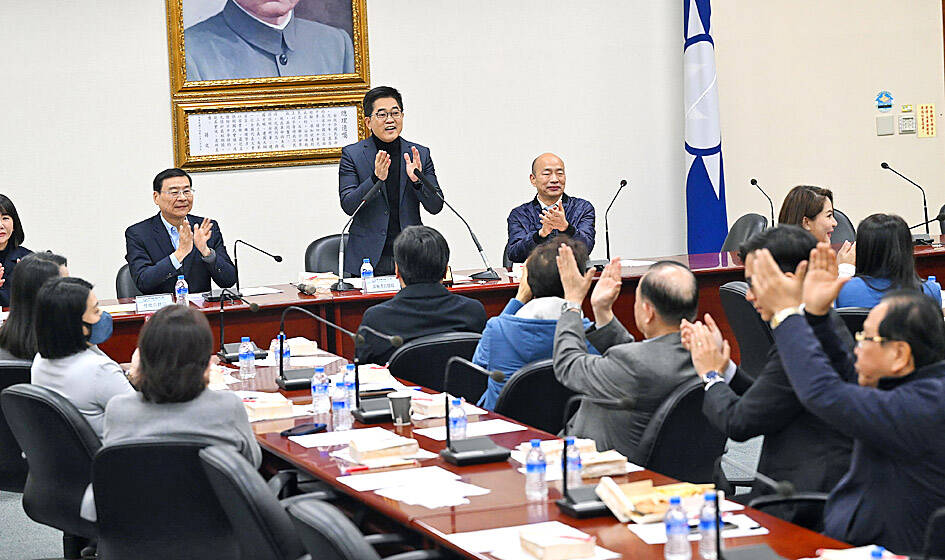The Chinese Nationalist Party (KMT) caucus yesterday pledged to reinstate the special investigation division of the Supreme Prosecutors’ Office and strictly oversee the government’s implementation of the death penalty as part of judicial reforms it plans to introduce in the new legislative session, which starts tomorrow.
Incoming KMT legislator-at-large Wu Tsung-hsien (吳宗憲), formerly a prosecutor and New Taipei City legal affairs bureau director, said the caucus would continue to push for the reinstatement of the special investigation division despite opposition from the Democratic Progressive Party and the Taiwan People’s Party.
“My idea is simple: Treat good people better and treat bad people worse. Prosecutors have been so burdened by their workload they do not have time to handle major cases in the same way the nation did when it had the special investigation division,” Wu told a news conference at the KMT’s headquarters in Taipei.

Photo: Chang Chia-ming, Taipei Times
The KMT caucus would also propose that a cap on prison sentences be extended from 15 years to 25 years, and that additional jail time for specific aggravated offenses be raised from 20 years to 30 years, he said.
The government should give judges the option to mete out life sentences without parole, and establish stricter criteria to scrutinize parole applications from inmates or requests to serve their sentences in minimum-security prisons, he said.
Wu said that he would closely monitor the Ministry of Justice’s implementation of death penalties.
The ministry has not enforced the Regulations for Executing the Death Penalty (死刑執行規則) for a long time, which is a clear case of the executive branch intervening in the judicial branch, he said.
The KMT caucus would address rising incidents of fraud, and gun and drug trafficking in the draft technology investigation act (科技偵查法) and seek separate sentences for manufacturing, transporting and selling drugs, he said.
The caucus would also propose amendments to the Cultural Heritage Preservation Act (文化資產保存法), Culture and the Arts Reward and Promotion Act (文化藝術獎助及促進條例), Development of the Cultural and Creative Industries Act (文化創意產業發展法) and the Cultural Fundamental Act (文化基本法) to better preserve cultural assets, increase funding for cultural development and relax regulations on corporate sponsorships in cultural and creative industries, incoming KMT legislator-at-large Lin Chien-chi (林倩綺) said.
The caucus previously proposed introducing absentee ballots, amendments to the Budget Act (預算法) and postponing the retirement of the Jinshan, Guosheng and Ma-anshan nuclear power plants.
Meanwhile, the KMT yesterday elected legislator-elect Fu Kun-chi (傅?萁) as its new caucus whip and Legislator Hung Meng-kai (洪孟楷) as the caucus’ new secretary-general.
Fu’s first task as the caucus whip is to ensure that incoming KMT legislator-at-large Han Kuo-yu (韓國瑜) and Legislator Johnny Chiang (江啟臣) would be elected legislative speaker and deputy speaker respectively at the start of the new legislative session.
Legislators who skip the vote, vote for other candidates or vote incorrectly would be subject to the strictest party discipline, Fu said.
“All KMT legislators are united and have clearly indicated that they would support Han and Chiang,” he said.
“All legislators must be present and cast their votes. Those who fail to do so would receive the strictest discipline from the party,” he added.

Taiwan has received more than US$70 million in royalties as of the end of last year from developing the F-16V jet as countries worldwide purchase or upgrade to this popular model, government and military officials said on Saturday. Taiwan funded the development of the F-16V jet and ended up the sole investor as other countries withdrew from the program. Now the F-16V is increasingly popular and countries must pay Taiwan a percentage in royalties when they purchase new F-16V aircraft or upgrade older F-16 models. The next five years are expected to be the peak for these royalties, with Taiwan potentially earning

STAY IN YOUR LANE: As the US and Israel attack Iran, the ministry has warned China not to overstep by including Taiwanese citizens in its evacuation orders The Ministry of Foreign Affairs (MOFA) yesterday rebuked a statement by China’s embassy in Israel that it would evacuate Taiwanese holders of Chinese travel documents from Israel amid the latter’s escalating conflict with Iran. Tensions have risen across the Middle East in the wake of US and Israeli airstrikes on Iran beginning Saturday. China subsequently issued an evacuation notice for its citizens. In a news release, the Chinese embassy in Israel said holders of “Taiwan compatriot permits (台胞證)” issued to Taiwanese nationals by Chinese authorities for travel to China — could register for evacuation to Egypt. In Taipei, the ministry yesterday said Taiwan

Taiwan is awaiting official notification from the US regarding the status of the Agreement on Reciprocal Trade (ART) after the US Supreme Court ruled US President Donald Trump's global tariffs unconstitutional. Speaking to reporters before a legislative hearing today, Premier Cho Jung-tai (卓榮泰) said that Taiwan's negotiation team remains focused on ensuring that the bilateral trade deal remains intact despite the legal challenge to Trump's tariff policy. "The US has pledged to notify its trade partners once the subsequent administrative and legal processes are finalized, and that certainly includes Taiwan," Cho said when asked about opposition parties’ doubts that the ART was

If China chose to invade Taiwan tomorrow, it would only have to sever three undersea fiber-optic cable clusters to cause a data blackout, Jason Hsu (許毓仁), a senior fellow at the Hudson Institute and former Chinese Nationalist Party (KMT) legislator, told a US security panel yesterday. In a Taiwan contingency, cable disruption would be one of the earliest preinvasion actions and the signal that escalation had begun, he said, adding that Taiwan’s current cable repair capabilities are insufficient. The US-China Economic and Security Review Commission (USCC) yesterday held a hearing on US-China Competition Under the Sea, with Hsu speaking on